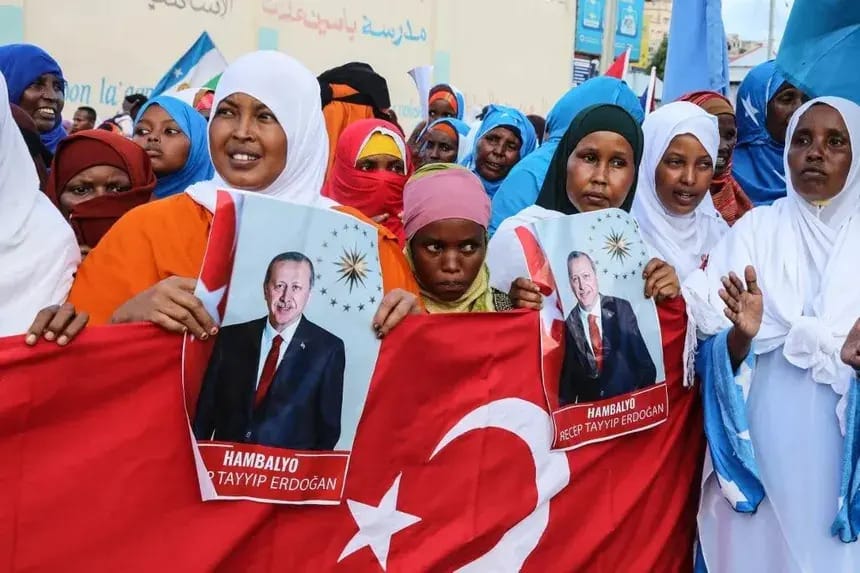
Bottom Line Up Front
Turkish troops in Somalia ramp up the chess match between the U.S. and China
Europe lays the groundwork for digital IDs and wallets
Indonesia hits the BRICS by signing on to their new development bank
Joseph Kabila’s return to the Congo comes with strings attached
Hey everyone—
Welcome to The Under Report, your weekly intelligence brief about the stories that move the world without making headlines.
📬 Learned something new? → Subscribe and share to keep The Under Report free.
— Eric
1. Turkish Boots Touch Ground in Somalia 🗨️ Quote this on X
Two Turkish military transports touched down in Mogadishu with an aim to station around 500 soldiers in Somalia, with talk of a larger rotation to follow. Ankara says this is a constrained attack on al‑Shabaab, but I’m skeptical. When a couple of thousand boots touch valuable ground they have a tendency to stay there. A military presence in Somalia gives Turkey (a NATO member) access to the Gulf of Aden, opposite the U.S. and Chinese bases in Djibouti.
Why this matters: Might makes right on the Horn of Africa. The UAE and Qatar have been dumping money into Somalia, but now Turkey has boots on the ground. The Gulf of Aden is the new flashpoint between Houthi rebel attacks on the Red Sea and Somaliland courting U.S. recognition.
What we’re watching for: A formal Status‑of‑Forces Agreement in the Turkish parliament, drone footage of Turkish Bayraktars outside Mogadishu, and how both Ethiopia and Somaliland react to a professional military in their backyard.
2. Europe’s Digital ID Wallet—Countdown to Compliance 🗨️ Quote this on X
On April 15, the European Commission opened a month‑long consultation on the Implementing Acts that hard‑code technical rules for the European Digital Identity (EUDI) Wallet—everything from cryptographic signatures to in‑app payments. Europe is notorious for being slow to adopt byzantine regulations for new technology, but when they do, the effects are sweeping. If and when the acts are adopted, EU member states have 24 months to launch digital wallets for 450 million citizens and resident companies.
Why it matters: Digital identity is a new frontier in the West. Having a single digital wallet that contains everything from identification to payment information could revolutionize travel and commerce. But governments and people are wary of creating Chinese‑style social‑credit systems and infringing on privacy rights.
What we’re watching for: Big tech and startups alike are going to duke it out to build the European infrastructure. Meanwhile, European outliers like Poland and Hungary will likely challenge the plan over “data sovereignty.”
3. Indonesia’s Silent BRICS Advance 🗨️ Quote this on X
Three weeks ago Jakarta accepted an invitation to join the BRICS‑backed New Development Bank. BRICS is an alliance of major emerging economies—Brazil, Russia, India, China, and South Africa—working together to boost trade, investment, and geopolitical influence as a counterweight to Western‑led institutions. The Indonesian president pitched renewables, biodiesel, and rail megaprojects while the New Development Bank promised no‑strings capital. Spoiler alert: there’s no such thing as “no strings.” This is big for the United States as the largest ASEAN economy is now hedging dollar dependence with a move toward BRICS even as it courts U.S. defense sales.
Why it matters: The United States is quick to use the dollar’s status as global reserve currency as a cudgel against political rivals, but that power might be waning. Indonesia is a major emerging economy, and a move toward settling contracts in BRICS currencies could mean shrugging off the yoke of the almighty dollar.
What we’re watching for: Jakarta’s promised rupiah‑yuan pilot, India’s appetite for more BRICS members, and New Development Bank board votes on Indonesian green infrastructure later this quarter.
4. Congo’s Mineral War Gets a Familiar Face 🗨️ Quote this on X
Former president Joseph Kabila popped up in rebel‑held Goma on Saturday, claiming he wants to “broker peace.” This is wild because Kabila has been accused of supporting the Rwanda‑backed M23 rebels who invaded Goma. Kabila is a political lightning rod in Congo who is likely financed by Chinese interests. His arrival is no coincidence as the United States is attempting to ink a “cobalt‑for‑security” deal to edge out Chinese investors.
Why it matters: The Democratic Republic of Congo is rich in minerals necessary to make electric vehicles. While oil and gas defined the front lines of the last decade, cobalt and lithium are the resources worth fighting for in the future. Erik Prince‑linked firms are shopping security packages to mineral‑extraction companies, and it seems that China is making its play through Joseph Kabila.
What we’re watching for: Regional support from Uganda, Angola, or Rwanda—signals of alignment for a larger African conflict. U.S. Treasury noise about sanctions on Kabila‑aligned entities, and whether Qatar’s cease‑fire talks stall.
Eric’s Tinfoil Hat 🎩 🗨️ Quote this on X
The Horn of Africa is heating up. The potential U.S. recognition of Somaliland could ignite violence, but with NATO‑member Turkey amassing soldiers around Mogadishu, this changes the calculus. Turkey could act as a stabilizing force, or it could significantly boost the lethality of the government in Mogadishu. This isn’t Turkey’s first time playing both sides against the center, and it is a great strategic play for them.
About Eric
Eric Czuleger is a journalist and travel writer who has lived and worked in over 47 countries. He holds a masters degree from the University of Oxford and he is completing a National Security degree from the RAND school of public policy. He's the author of You Are Not Here: Travels Through Countries That Don’t Exist, and host of the “This Is Not a PsyOp” TikTok channel.
📚 Liked today’s brief? Dive deeper—check out my book You Are Not Here: Travels Through Countries That Don't Exist and explore the world’s unrecognized countries.
💬 Hit reply with your spiciest take—top comment gets featured next week.
